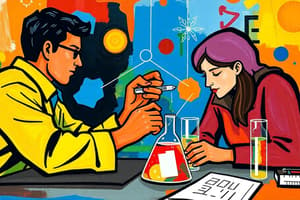Podcast
Questions and Answers
Which branch of general science focuses on living organisms?
Which branch of general science focuses on living organisms?
- Life Science (correct)
- Physical Science
- Chemical Science
- Earth Science
The hypothesis is the final step in the scientific method.
The hypothesis is the final step in the scientific method.
False (B)
What are the two main types of cells?
What are the two main types of cells?
Prokaryotic and Eukaryotic
The law stating that mass is neither created nor destroyed in a chemical reaction is known as the __________.
The law stating that mass is neither created nor destroyed in a chemical reaction is known as the __________.
Match the following scientific instruments with their primary uses:
Match the following scientific instruments with their primary uses:
What is the primary focus of Earth Science?
What is the primary focus of Earth Science?
All ecosystems consist solely of biotic factors.
All ecosystems consist solely of biotic factors.
What is the primary purpose of the scientific method?
What is the primary purpose of the scientific method?
In scientific notation, a number is expressed in the form of __________.
In scientific notation, a number is expressed in the form of __________.
Which of the following is not a type of renewable energy?
Which of the following is not a type of renewable energy?
Flashcards are hidden until you start studying
Study Notes
Branches of General Science
-
Physical Science
- Studies non-living systems.
- Includes physics and chemistry.
-
Life Science
- Focuses on living organisms.
- Includes biology, botany, and zoology.
-
Earth Science
- Examines Earth and its components.
- Includes geology, meteorology, and oceanography.
Scientific Method
- Observation: Gather data through the senses.
- Hypothesis: Formulate a testable explanation.
- Experimentation: Test the hypothesis with controlled experiments.
- Analysis: Interpret the data collected.
- Conclusion: Draw conclusions based on the analysis.
- Report: Share findings for peer review.
Basic Concepts
-
Atoms & Molecules
- Atoms: Basic units of matter.
- Molecules: Combinations of two or more atoms.
-
Cells
- Basic unit of life.
- Types: Prokaryotic (no nucleus) and Eukaryotic (with nucleus).
-
Ecosystems
- Community of living organisms interacting with their environment.
- Biotic (living) and abiotic (non-living) factors.
Important Laws and Theories
-
Newton's Laws of Motion
- 1st: An object at rest stays at rest unless acted upon.
- 2nd: Acceleration is dependent on force and mass (F=ma).
- 3rd: For every action, there is an equal and opposite reaction.
-
Law of Conservation of Mass
- Mass is neither created nor destroyed in a chemical reaction.
-
Theory of Evolution
- Explains the diversity of life through natural selection.
Measurements in Science
-
Metric System
- Standard measurement system used globally.
- Units: meter (length), liter (volume), gram (mass).
-
SI Units
- International System of Units.
- Base units include meter (m), kilogram (kg), second (s), ampere (A).
Key Scientific Instruments
- Microscope: Magnifies small objects for study.
- Telescope: Allows observation of distant celestial bodies.
- Balance: Measures mass with precision.
Current Topics in General Science
- Climate Change: Study of long-term changes in temperature and weather patterns.
- Genetic Engineering: Manipulation of an organism's DNA.
- Renewable Energy: Sustainable energy sources like solar, wind, and hydro.
Basic Scientific Notation
- Used to express very large or very small numbers.
- Format: ( a \times 10^n ), where ( 1 \leq a < 10 ) and n is an integer.
Branches of General Science
- Physical Science studies non-living systems, including physics and chemistry.
- Life Science focuses on living organisms, encompassing biology, botany, and zoology.
- Earth Science examines Earth and its components, including geology, meteorology, and oceanography.
Scientific Method
- Observation involves gathering data through the senses.
- Hypothesis is a testable explanation formulated based on observations.
- Experimentation tests the hypothesis using controlled experiments.
- Analysis involves interpreting the data collected during the experiment.
- Conclusion is drawn based on the analysis of the data.
- Report shares the findings for peer review and further scientific inquiry.
Basic Concepts
- Atoms are the basic units of matter.
- Molecules are combinations of two or more atoms.
- Cells are the basic unit of life, classified as prokaryotic (lacking a nucleus) or eukaryotic (containing a nucleus).
- Ecosystems consist of communities of living organisms interacting with their environment, including biotic (living) and abiotic (non-living) factors.
Important Laws and Theories
- Newton's Laws of Motion describe the relationship between force, mass, and motion:
- 1st Law: An object at rest stays at rest, and an object in motion stays in motion with the same speed and in the same direction unless acted upon by an unbalanced force.
- 2nd Law: The acceleration of an object is directly proportional to the net force acting on it, and inversely proportional to its mass (F=ma).
- 3rd Law: For every action, there is an equal and opposite reaction.
- Law of Conservation of Mass states that mass is neither created nor destroyed in a chemical reaction.
- Theory of Evolution explains the diversity of life through natural selection, where organisms best adapted to their environment are more likely to survive and reproduce.
Measurements in Science
- Metric System is the standard system of measurement used globally, employing units like meter (length), liter (volume), and gram (mass).
- SI Units (International System of Units) provides a standardized basis of measurement, with base units including meter (m), kilogram (kg), second (s), and ampere (A).
Key Scientific Instruments
- Microscope magnifies small objects for detailed study.
- Telescope assists in observing distant celestial bodies.
- Balance measures mass with precision.
Current Topics in General Science
- Climate Change focuses on studying long-term changes in global temperature and weather patterns.
- Genetic Engineering involves manipulating an organism's DNA for various applications.
- Renewable Energy explores sustainable energy sources like solar, wind, and hydro power.
Basic Scientific Notation
- Scientific notation is used to express very large or very small numbers in a concise format.
- The format is ( a \times 10^n ), where ( 1 \leq a < 10 ) and n is an integer representing the power of ten.
Studying That Suits You
Use AI to generate personalized quizzes and flashcards to suit your learning preferences.




